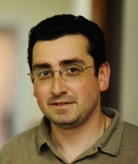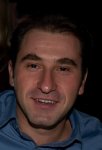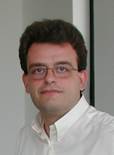2013 Multi-modal Gesture Recognition Workshop ICMI
Invited speakers

Leonid Sigal
Disney Research Pittsburgh
lsigal@disneyresearch.com
Leonid Sigal was born in Kiev, Ukraine. He is a Senior Research Scientist at Disney Research Pittsburgh, in conjunction with Carnegie Mellon University. Prior to this he was a postdoctoral fellow in the Department of Computer Science at University of Toronto. He completed his Ph.D. under the supervision of Prof. Michael J. Black at Brown University; he received his B.Sc. degrees in Computer Science and Mathematics from Boston University (1999), his M.A. from Boston University (1999), and his M.S. from Brown University (2003). From 1999 to 2001, he worked as a senior vision engineer at Cognex Corporation, where he developed industrial vision applications for pattern analysis and verification. His work received the Best Paper Award at the Articulate Motion and Deformable Objects Conference in 2006 (with Prof. Michael J. Black).

Cristian Sminchisescu
Lund University, Lund, Sweden
cristian.sminchisescu@math.lth.se
Cristian Sminchisescu is a Professor in the Department of Mathematics, Faculty of Engineering at Lund University, working in computer vision and machine learning. He has obtained a doctorate in computer science and applied mathematics with focus on imaging, vision and robotics at INRIA, France, under an Eiffel excellence doctoral fellowship of the French Ministry of Foregin Affairs, and has done postdoctoral research in the Artificial intelligence Laboratory at the University of Toronto. He holds a Professor equivalent title at the Romanian Academy and a Professor rank, status appointment at Toronto, and advises research at both institutions. During 2004-07, he has been a Faculty member at the Toyota Technological Institute, a philanthropically endowed computer science institute located at the University of Chicago, and later on the Faculty of the Institute for Numerical Simulation in the Mathematics Department at Bonn University. Cristian Sminchisescu is a member in the program committees of the main conferences in computer vision and machine learning (CVPR, ICCV, ECCV, ICML, NIPS), an Area Chair for ICCV, ACCV and CVPR during 2007-15, a Program Chair for ECCV 2018, and a member of the Editorial Board (Associate Editor) of IEEE Transactions for Pattern Analysis and Machine Intelligence (PAMI). He has offered tutorials on 3d tracking, recognition and optimization at ICCV and CVPR, the Chicago Machine Learning Summer School, the AEFRAI Vision School in Barcelona, the Computer Vision summer school at ETH in Zurich, and Visum in Porto. Over time, his work has been funded by the US National Science Foundation, the Romanian Science Foundation, the German Science Foundation, the Swedish Science Foundation, the European Commission under a Marie Curie Excellence Grant, and the European Research Council under an ERC Consolidator Grant. Cristian Sminchisescu's research goal is to train computers to `see' and interact with the world seamlessly, as humans do. His research interests are in the area of computer vision (articulated objects, 3d reconstruction, segmentation and recognition) and machine learning (optimization and sampling algorithms, structured prediction and kernel methods). The visual recognition methodology developed in his group was a winner of the PASCAL VOC object segmentation and labeling challenge over the past four editions, 2009 - 2012, as well as state of the art and winner, respectively, in the Reconstruction Meets Recognition Challenge (RMRC) 2013 and 2014.

Antonis Argyros
University of Crete, Crete, Greece
argyros@ics.forth.gr
Antonis A. Argyros (Αντώνης Αργυρός) is a Professor of Computer Science at the Computer Science Department (CSD), University of Crete (UoC) and a researcher at the Institute of Computer Science (ICS), Foundation for Research and Technology-Hellas (FORTH) in Heraklion, Crete, Greece. He received a B.Sc. degree in Computer Science (1989) and a M.Sc. degree in Computer Science (1992), both from the Computer Science Department, University of Crete. On July 1996, he completed his PhD on visual motion analysis at the same Department. He has been a postdoctoral fellow at the Computational Vision and Active Perception Laboratory (CVAP) at the Royal Institute of Technology in Stockholm, Sweden. Since 1999, as a member of the Computational Vision and Robotics Laboratory (CVRL) of FORTH-ICS, he has been involved in many RTD projects in computer vision, image analysis and robotics.His current research interests fall in the areas of computer vision and pattern recognition, with emphasis on the analysis of humans in images and videos, human pose analysis, recognition of human activities and gestures, 3D computer vision, as well as image motion and tracking. He is also interested in applications of computer vision in the fields of robotics and smart environments. In these areas, he has published more than 160 papers in scientific journals and refereed conference proceedings and has also delivered several invited and keynote talks in international events, universities and research centers.

Richard Bowden
University of Surrey, Guildford, United Kingdom
r.bowden@surrey.ac.uk
Richard Bowden received a BSc in computer science from the University of London in ’93, an MSc with distinction from the University of Leeds in ’95, and a PhD in computer vision from Brunel University in ’99 for which he was awarded the Sullivan Doctoral Thesis Prize. He is Professor of Computer Vision and Machine Learning at the University of Surrey, UK, where he leads the Cognitive Vision Group within the Centre for Vision Speech and Signal Processing and was recently awarded a Royal Society Leverhulme Trust Senior Research Fellowship. His research centres on the use of computer vision to locate, track, and understand humans. He is an Associate Editor for Image and Vision Computing and IEEE Pattern Analysis and Machine Intelligence. He was a member of the British Machine Vision Association (BMVA) executive committee and a company director for seven years. He is a member of the BMVA, a fellow of the Higher Education Academy, and a senior member of the IEEE.
News
There are no news registered in